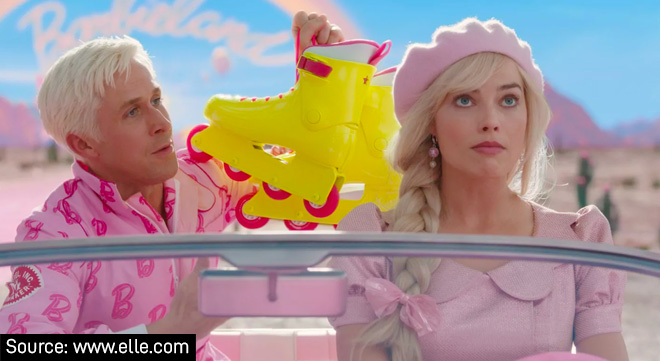Whether or not you are a fan of Barbie and her trusted sidekick, Ken, you can’t discount the financial punch this power couple brings to the “Dreamhouse” table.
The release of Barbie on 21 July shows that although the movie’s leading lady may have a thing for pink, she sure knows how to bring in the green.
Forbes reported last week that director Greta Gerwig’s live-action movie had grossed more than $200 million (just over R3.5 billion) at the US box office in its first five days in theatres. Worldwide, it fetched more than $337m (R6bn) on release.
Besides making bank at the box office, “Barbie mania” has left the global stock market in the pink with shares in toy company Mattel surging by 1.8% over the past month.
Locally, Catherine Jacoby, the marketing manager for Toys R Us, told News24 that Barbie dolls were flying off the shelves in South Africa. With the opening of the movie, the toy retailer saw Barbie sales surge by 30%.
Stakeholders along the rest of the entertainment value chain have also seen positive results, with the value of IMAX’s stock rising by 2.9%.
Kamogelo Mosime, partnership manager at Tickmill, a forex and CFD broker, says this is an indication of the impact pop culture can have on the economy.
In June, economists pointed to the sold-out concerts of top artists Beyoncé and Taylor Swift as the reason the inflation rate rose in two countries.
BBC News reported that the start of Beyoncé’s Renaissance World Tour in Sweden in May sparked such a frenzy of demand for hotels and restaurant meals that it showed up in the country’s economic statistics. Sweden reported higher-than-expected inflation of 9.7% in May, with the cause of the increase traced to the rise in prices for hotels and restaurants, the news channel reported.
As Swift heads to California for the final leg of her Eras Tour, The Mercury News reported last week that it was on track to becoming the highest-grossing music tour of all time, with more than $1bn in revenue anticipated – along with a boost to the economies of the cities the tour visited. QuestionPro, an industry leader in insights, experiences, and software, predicted Swift’s tour could generate $4.6bn in spending across the US.
Seeing pink
Delving deeper into “Barbie mania”, Mosime says that, ahead of the release of the Barbie movie, analysts forecast that Mattel’s stock would see a significant upsurge in value, with estimates predicting an opening weekend of between $90m and $100m and a worldwide gross of between $450m and $550m.
Capitalising on the foreseen hype, Mattel entered strategic partnerships with several manufacturers and merchandisers. Outlets such as Gap and Forever 21 were among the brands that received licences to produce Barbie-branded apparel.
Mosime adds that the subsequent increase in the value of Mattel’s shares has been linked to positive investor sentiment ahead of the launch of the movie and the implications for Mattel’s revenue and growth prospects. With Mattel now having outperformed its main competitor, Hasbro, all indicators suggest this confidence was well placed, with shareholders looking to rake in the dividends.
Another demonstration of how sentiment and market dynamics can change based on external factors, Mosime says, is the recent 33% increase in AMC Entertainment Holdings’ stock value after a US judge rejected a settlement proposal.
According to a CNBC report, the company was sued in February for allegedly rigging a shareholder vote that would allow AMC to convert preferred stock to common stock and issue hundreds of millions of new shares. On 21 July, a judge blocked a proposed settlement on AMC’s stock conversion plan, sending its common shares soaring and its preferred shares down in after-hours trading.
Mosime says the intersection of pop culture events with market developments can create both opportunities and risks for investors.
“Overall, the influence of pop culture on the markets demonstrates the interconnectedness of various sectors and how consumer behaviour, sentiment, and trends can shape investment decisions.”
He says that, as pop culture continues to evolve, it will remain an important factor for investors to consider when analysing market trends and weighing up the potential for risk and reward.
Disclaimer: Mosime’s views are his own and do not represent the views of Tickmill.



